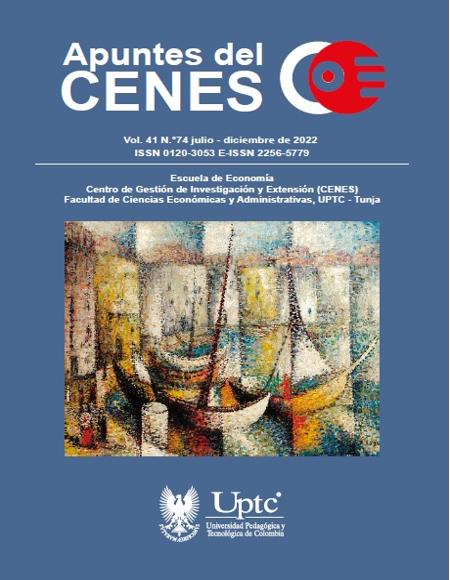Academic Programs of Economics: Comparative Analysis of Europe and Colombia

Abstract
A sample of 22 European universities is compared with a sample of 7 Colombian universities located in Bogotá with undergraduate programs in Economics, using a benchmarking methodology defined by UNESCO for the identification of best curricular practices. To facilitate the identification of good practices in terms of research results, the sample of the European and Colombian universities was classified according to the research results ranking developed by Tilburg University (TUER). The results indicate the prevalence of eight trends in disciplinary development, in which the teaching of applied mathematics, languages, and elective courses in the social sciences stand out, the importance of the articulation of the foundation components, elective courses and research courses on problems defined based on the consolidation of an academic community in the economic sciences, particularly in Colombia. This leads to two particular recommendations for the design of economics curricula in Colombia. On the one hand, the design of a pedagogy program in economics teaching with an ethical component and an evaluation orientation towards teaching practices is relevant for the management of knowledge about the scope of the foundation component on learning objectives. On the other hand, research and consulting require a more relevant orientation and articulation in the curricular programs based on an academic community with specific functions in the determination of economic problems of interest for economic development in Colombia.
Keywords
benchmarking, curriculum , economics, knowledge management, economic development, Europe, Colombia
References
- Aubad, R. & Vásquez, M. (1999). La consultoría económica: invitación a una discusión completa. En J. A. Bejarano (comp.) (1.a ed.), Hacia dónde va la ciencia económica en Colombia. Siete ensayos exploratorios (pp. 209-241). Colciencias, Tercer Mundo Editores y Universidad Externado de Colombia.
- Becker, W. (2000). Teaching Economics in the 21st Century. Journal of Economics Perspectives, 14(1), 109-119. https://doi.org/10.1257/jep.14.1.109 DOI: https://doi.org/10.1257/jep.14.1.109
- Bejarano, J. (Comp.) (1999a). Hacia dónde va la ciencia económica en Colombia. Siete ensayos exploratorios (1.a ed.). Colciencias. Tercer Mundo Editores y Universidad Externado de Colombia.
- Bejarano, J. (1999b). Evaluación del estado de la disciplina económica en Colombia: un enfoque institucional. En J. A. Bejarano (comp.), Hacia dónde va la ciencia económica en Colombia. Siete ensayos exploratorios (pp. 3-45). Colciencias, Tercer Mundo Editores y Universidad Externado de Colombia.
- Bejarano, J. (1999c). La investigación económica en Colombia. En J. A. Bejarano (comp.), Hacia dónde va la ciencia económica en Colombia. Siete ensayos exploratorios (pp. 179-204). Colciencias, Tercer Mundo Editores y Universidad Externado de Colombia.
- Bejarano, J. (1999d). La profesionalización en economía. En J. A. Bejarano (comp.), Hacia dónde va la ciencia económica en Colombia. Siete ensayos exploratorios (pp. 249-276). Colciencias, Tercer Mundo Editores y Universidad Externado de Colombia.
- Congreso de la República de Colombia. (2008). Ley 1188 de 2008. Por la cual se regula el registro calificado de programas de educación superior y se dictan otras disposiciones. Mineducación. https://www.mineducacion.gov.co/1621/articles-159149_archivo_pdf.pdf
- Demartino, G. (2005, jul.-ago.). A professional Ethics Code for Economists. Challenge, 48(4), 88-104. DOI: https://doi.org/10.1080/05775132.2005.11034308
- Demartino, G. (2009). On the Need for Professional Economic Ethics. Challenge, 52(4), 6-15. https://doi.org/10.2753/0577-5132520401 DOI: https://doi.org/10.2753/0577-5132520401
- Freeman, A. (1999). The Emperor´s Tailor: The Economics and the Crash on ’98. Munich Personal RePEc Archive. http://mpra.ub.uni-muenchen.de/6712/
- Freeman, A. (2010). The Economist of Tomorrow: The Case for a Pluralist Subject Benchmark Statement for Economics. International Review of Economics Education, 8(2), 23-40. https://doi.org/10.1016/S1477-3880(15)30070-0 DOI: https://doi.org/10.1016/S1477-3880(15)30070-0
- Garoupa, N. (2004). Regulation of Professions in Portugal: A Case Study in Rent-Seeking. In II Conferência sobre Desenvolvimento Económico Português no Espaço Europeu. http://www.bportugal.pt/pt-PT/EstudosEconomicos/Conferencias/Documents/2004DesenvEcon/13_NGaroupa.pdf
- Gärtner, M. (2001), Teaching Economics to Undergraduates in Europe: Volume, Structure and Contents. The Journal of Economic Education, 32(3), 219-230. https://doi.org/10.2307/1183380 DOI: https://doi.org/10.1080/00220480109596104
- González, J. I. (1999) La fetichización del currículo y la absolutización del libro de texto. En J. A. Bejarano (comp.), Hacia dónde va la ciencia económica en Colombia. Siete ensayos exploratorios (pp. 53-84). Colciencias, Tercer Mundo Editores y Universidad Externado de Colombia.
- Jalil, M. & Salazar, B. (1999). El estado de la investigación académica: del vacío a la comunidad virtual. En J. A. Bejarano (comp.), Hacia dónde va la ciencia económica en Colombia. Siete ensayos exploratorios (pp. 143-176). Colciencias, Tercer Mundo Editores y Universidad Externado de Colombia.
- Ministerio de Educación Nacional (2010). Decreto 1295 de 2010. Por el cual se reglamenta el registro calificado de que trata la Ley 1188 de 2008 y la oferta y desarrollo de programas académicos de educación superior. https://www.mineducacion.gov.co/1621/articles-229430_archivo_pdf_decreto1295.pdf
- Ministros europeos de Educación. (1999, 19 de jun.). Declaración de Bolonia. https://www.educacionyfp.gob.es/dctm/boloniaeees/documentos/02que/declaracionbolonia.pdf?documentId=0901e72b8004aa6a
- Monteiro, H. & Lopes, A. (2007). A Benchmarking of the Undergraduate Economics Major in Europe and in the United States. International Review of Economic Education, 6(2), 9-26. https://doi.org/10.1016/S1477-3880(15)30106-7 DOI: https://doi.org/10.1016/S1477-3880(15)30106-7
- Prieto, W. & Tejedor J. (2017). La ciencia económica en tiempos de crisis. Revista Apuntes del Cenes, 36(6)4, 47-78. https://doi.org/10.19053/01203053. DOI: https://doi.org/10.19053/01203053.v36.n64.2017.5937
- Prieto, W. & Tejedor, J. (2020), La generación de nuevo conocimiento en economía: un modelo de crecimiento endógeno. Revista Finanzas y Política Económica, 12(2), 553-588. https://doi.org/10.14718 DOI: https://doi.org/10.14718/revfinanzpolitecon.v12.n2.2020.3729
- Sanz de Santamaría, A. (1999). Enseñanza de la economía: aspectos metodológicos y pedagógicos, en enfoque institucional. En J. A. Bejarano (comp.), Hacia dónde va la ciencia económica en Colombia. Siete ensayos exploratorios (pp. 89-140). Colciencias, Tercer Mundo Editores y Universidad Externado de Colombia.
- Tilburg University. (2012). Tilburg University Economics Rankin. EPGE. https://epge.fgv.br/files/default/ranking-tilburg-2010-2012.pdf
